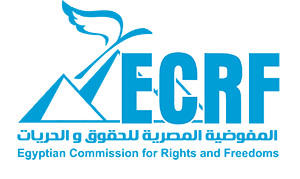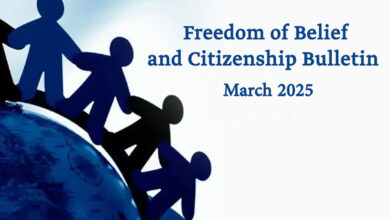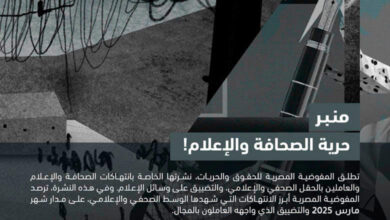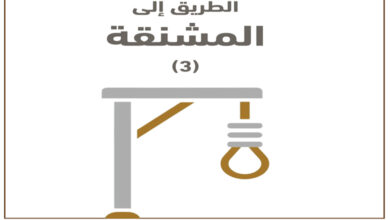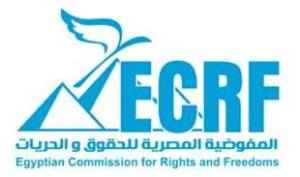ECRF: Egyptian Authorities Must Immediately Release Human Rights Defenders and Activists Suffering Health Problems
ECRF documented cases of prisoners of conscience who are at risk, including Abou El-Fotouh, Ezz El-Din, Al-Qassass, El-Elaimy, and Ramy Kamel.
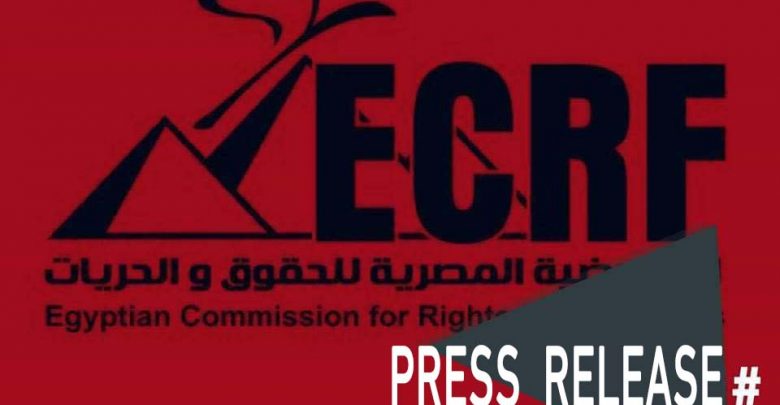
Egyptian Commission fro Rights and Freedoms.
Press release
ECRF: Egyptian Authorities Must Immediately Release Human Rights Defenders and Activists Suffering Health Problems
ECRF documented cases of prisoners of conscience who are at risk, including Abou El-Fotouh, Ezz El-Din, Al-Qassass, El-Elaimy, and Ramy Kamel.
Cairo – 3 May 2020
The Egyptian Commission for Rights and Freedoms (ECRF) renews its demands to the Egyptian authorities to immediately release human rights defenders, prisoners of conscience and political activists imprisoned on remand or serving jail term in political cases or because of practicing one of the rights protected by international law who are suffering from health or immunological conditions that make them especially vulnerable amid the outbreak of the coronavirus (COVID-19) pandemic. It affirms that they must be promptly released in order to save their lives and end their prolonged arbitrary detention. This should be done as part of a wide range of drastic measures that must be taken to prevent the outbreak of the virus in prisons and different detention places, as previously demanded by ECRF in previous statements.
Many human rights defenders and political prisoners suffer health conditions that make them highly vulnerable to COVID-19. ECRF documented the health conditions of a number of human rights defenders and political activists that it considers among those who are most vulnerable to coronavirus in case it spreads into prisons and detention facilities. ECRF affirms that this is by no means an exhaustive list of all human rights defenders, political activists or prisoners of conscience who have health conditions that make them risk. It rather includes those who ECRF managed to obtain information on their health conditions and document it.
ECRF documented the health condition of human rights defender Ibrahim Ezz El-Din. Ezz El-Din is an urban researcher at ECRF. He suffers allergy in the respiratory system which makes him at great risk if he contracts the virus. Ezz El-Din also suffers severe depression and other health problems resulting from torture, starvation and cruel detention circumstances he was subjected to during the period of his enforced disappearance from June to November 2019. All this adversely affects his immunity, and makes him more vulnerable to the disease. ECRF considers that the continuous imprisonment of Ibrahim Ezz El-Din is an extension of his arbitrary detention since he forcibly disappeared in June 2019 until he was officially charged in case no. 488 for 2019 with publishing false news, and engaging in the activities of a terrorist organization while knowing its objectives.
Likewise, the Coptic activist Ramy Kamel has severe respiratory allergy which makes him vulnerable in case his remand detention continues. Security forces arrested Ramy Kamel from his home in November 2019. He was charged by Supreme State Security Prosecution (SSSP) with several accusations including publication of false news, misuse of social media, joining and funding a terrorist organization in case no. 1475 for 2019. Likewise, lawyer and human rights defender Mohamed El-Baqer, the director of Adala Center for Rights and Freedoms, has asthma. This poses severe danger to his life in case he gets infected with coronavirus. El-Baqer was arrested in September 2019 from inside the building of SSSP while he was doing his job. He was charged with membership in and funding of an inflammatory group, and publishing false news in case no. 1356 for 2019.
Also, lawyer and human rights defender Ibrahim Metwally suffers general deterioration of his health as a result of the extremely poor detention conditions he was subjected to since his arrest in September 2017, including torture, enforced disappearance, and continuous remand detention. Because of his deteriorating health conditions and lack of appropriate health care, he has enlarged prostate, arthritis, very weak sight, and nerve dysfunction causing him limb tremor. Ibrahim Metwally exceeded the maximum period for remand detention in case no. 900 for 2017, and a decision was issued of his release in October 2019. However, he was not set free. He forcibly disappeared for two weeks before he appeared as a defendant again in case no. 1470 for 2019 in which he is charged with joining a terrorist organization, funding terrorism, publishing false news, and misusing social media.
Political activists, Zyad El-Elaimy and Mohamed El-Qassass (member of the political party Misr El-Qaweya), have hypertension and diabetes which make them at great risk if they contract COVID-19. Moreover, Zyad El-Elaimy has recurrent breathing difficulties as a result of having a rare immunological disease, as well as pericardial effusion, so his continuous detention poses a great risk for his safety. Zyad El-Elaimy’s family filed a lawsuit demanding to transfer him to a hospital outside the prison to have the adequate healthcare he needs at the expense of his family.
Aisha Al-Shater, member of the Egyptian Coordination for Rights and Freedoms, has aplastic anemia which contributed to the deterioration of her health conditions in prison. She had severe bleeding and was moved to Kasr Al-Aini Hospital to be treated. However, her case needs specialized, continuous and intensive care in a medical facility that is appropriately equipped. In her current condition, her life is still at great risk of sepsis or bleeding. She also suffers bone marrow failure which makes her body incapable of making blood cells necessary for carrying oxygen to body tissues (red blood cells) or defending it in case she had any infection (white blood cells). This may lead to septicemia which is an emergency that may lead to death. Security forces arrested Aisha Al-Shater from her home on the first of November 2018. She forcibly disappeared until she appeared on the 25th of November 2018 as a defendant in SSSP case no. 1552 for 2019 and was charged with joining a group established in violation of law and constitution.
Former presidential candidate Abdel-Moneim Abou El-Fotouh, 68 years old, is at great risk as well. In addition to his old age, he had two heart attacks. The first one happened in his solitary cell in Tora Mazraa Prison. The second one took place in the presence of national security officers and investigation officers after he was moved from Mazraa Prison to Maximum Security Prison 2 to meet his family. In addition, he has enlarged prostate. He was scheduled for surgery before he was arrested in February 2018, but this didn’t happen. With continuous medical negligence, his enlarged prostate is worsening causing severe congestion, adverse effects on kidneys and bladder, and difficulties urinating. He also has diabetes which causes sudden increases and decreases in sugar level. It is difficult to control his sugar level in prison because healthy food is not available. On the 27th of June 2019, his lawyers submitted a complaint to the Public Prosecutor (No. 8840 for 2019) demanding his urgent intervention to save him from deliberate medical negligence inside his prison in Tora Mazraa Prison in a way that violates Prison Law and Regulations.
ECRF again reminds Egyptian authorities of its international obligations regarding the prevention, treatment and control of epidemic and endemic diseases according to article 12 of the International Covenant on Economic, Social and Cultural Rights of 1966, as well as its constitutional obligations regarding the treatment of people deprived of their freedom in a way that preserves their human dignity, the prohibition of any act that violates their dignity or endangers their health in prisons and detention places, and the obligation to provide comprehensive health care with quality criteria to all citizens without discrimination, according to articles 18, 55 and 56 of the Constitution of Egypt for 2014.
